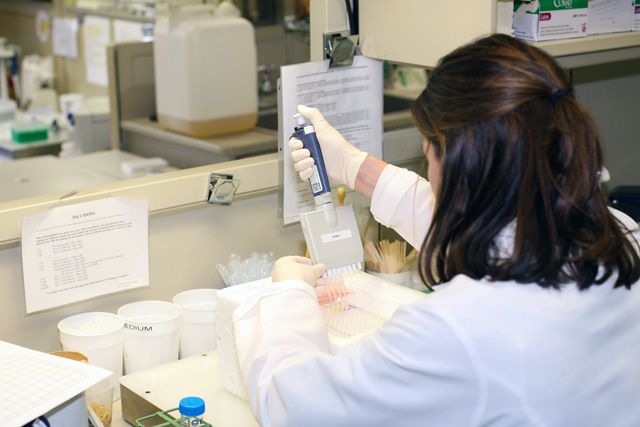
April is National Donate Life Month, designated to raise awareness of the need for organ donors and to celebrate those that have saved lives through the gift of donation.
If you need an organ transplant here in the Pacific Northwest, chances are that the Immunogenetics/HLA (Human Leukocyte Antigen) Lab at Bloodworks Northwest would make sure that donated organs were the right fit for your body.
Bloodworks Northwest’s HLA Lab does testing for solid-organ transplantation for the largest region in the US, which stretches from Alaska to Montana to Oregon. Inland Northwest’s HLA Lab in Spokane shares this territory. This large geographic area comes with the logistical problems of making sure we receive current blood samples in a timely manner and that they don’t freeze or overheat in transit (or the blood cells become unusable).
Most cities that support solid-organ transplantation and bone marrow/stem cell transplantation have one HLA lab that does HLA testing for both. Seattle has two HLA labs: Seattle Cancer Care Alliance does all the testing for stem cell transplants, and BloodworksNW does all the solid organ lab work.
Our lab is essentially the link between LifeCenter NorthWest, which identifies donors and procures the organs, and the hospitals, which transplant them into patients in need. Together, we facilitated 580 transplants in 2014.
According to Dr. Paul Warner, the Laboratory’s Director and Clinical Consultant,
The testing is so specialized that it typically takes two years to train a technologist in all the assays performed for transplant testing. Technologists working in our HLA lab must demonstrate competency to perform these complex assays – and juggle multiple situations – before they can cover after-hours testing and release results directly to transplant surgeons and coordinators.
The lab does both pre- and post-transplant testing.
Any organ – heart, lung, pancreas, liver, or kidney – is invaluable. Consider a kidney, for example. You can’t put a price on it, especially from a living donor. Our goal is to make sure that every kidney that’s transplanted has the longest graft survival possible. The half-life of the average kidney transplant is approximately 12 years. This means that at the end of 12 years, half of the patients who received a kidney transplant have lost that kidney. They usually come back on our list, hopeful for a chance at another organ transplant.
This is why post-transplant testing is also critical. If a patient begins making antibodies against the transplanted graft, the HLA lab can detect and identify these antibodies before they cause irreparable harm to the transplanted organ. Detecting potential problems before they become critical allows doctors to treat them and potentially save the organ.
Another primary function of the HLA Lab is to identify and discuss the risk balance, for any particular donor/recipient pair, with the patient’s health care providers. These conversations often happen in the middle of the night. An organ that isn’t a 100% match will have risk of rejection over the course of time, but there’s also a risk of not transplanting because a patient may die without it.
“There’s rarely a black or white distinction in terms of risk in what we do. We work really closely with surgeons and doctors to evaluate that risk: keeping someone alive with a transplant vs. giving them an organ that may be greater-than-zero risk (but not so risky that if you transplant it, the [body] is going to immediately reject it).”
All pancreas, liver, heart and lung transplants come from deceased donors, and about half of kidney transplants come from deceased donors. Typically, these are people who have been involved in an auto accident or some other trauma that causes brain death.
Many people who need a kidney transplant can survive by getting their blood cleaned by dialysis, but there’s limited access to artificial hearts and no artificial lungs for long-term support— those people are going to die if they don’t get a transplant. There’s a big disparity between the numbers of people waiting for organs versus the numbers of deceased donors; there are currently 1200 people on the kidney waitlist in our region, and over 100,000 in the United States. Unfortunately, only about 10-20% of these patients will be transplanted in any given year due to the lack of donors. People in desperate need of a kidney transplant often wait for over five years to get one. Wait-list mortality (people who die before they can get a transplant) for heart and lung transplant candidates is especially high.
Dr. Warner encourages you to have a conversation with your loved ones about your organ donation wishes; the longer you wait, even when someone is on life support, the more the body deteriorates and the organs become less and less viable.
“We don’t have presumed consent in the US. If a family member says, ‘no, I don’t want you to take his organs away,’ [hospitals] can’t move forward to procure the organs for transplant. It’s a difficult decision to make during a devastating time in these people’s lives. And there are so many more people who could get transplants that don’t, because people don’t want to discuss it, to make it clear to their family that they want to be an organ donor if the unthinkable happens.”
This conversation can be difficult, but it’s a conversation that can mean life or death for someone in a race against time.
Tell Us What You Think!